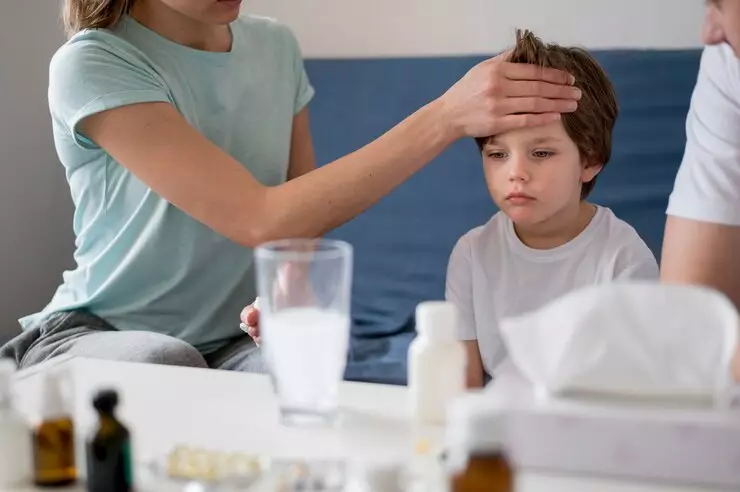foto: freepik.com
Brilio.net - A number of parents are currently worried about the hepatitis disease that is stalking their children. Until now the exact cause is not known. According to information from the World Health Organization (WHO) on April 5 2022, acute hepatitis mysteriously attacks children in various countries. According to reports, 169 cases of hepatitis spread throughout the world and 17 children required liver transplants, as well as 1 case of child death due to hepatitis.
Please note that hepatitis can be caused by infection with the hepatitis A, B, C, D, and E viruses. This disease which causes infection of the liver is caused by the hepatitis virus. These viruses can spread through direct contact with a source of infection, such as contaminated water, contact with an infected person, or through vectors such as mice.
This condition is getting worse due to the lack of prevention and public awareness about hepatitis, making children more vulnerable to infection. Effective prevention to avoid this disease includes vaccination, wearing masks, and maintaining cleanliness. There are several factors that cause children to be susceptible to hepatitis, for example being physically and mentally weak, making them more susceptible to hepatitis infection.
Apart from that, stress, lack of nutrition and vitamins can also make children's immune systems weaker. There are several ways to recognize the early symptoms of hepatitis, one of which is a change in urine color. The following is the complete review, as reported by brilio.net from various sources on Friday (5/7).
Recognize changes in urine as a marker of hepatitis in children

photo: freepik.com
You need to know that hepatitis in children can be diagnosed through urine color that is different from usual. Urine in children which is usually clear or light yellow can turn dark in color. Apart from that, stool or stool also experiences significant changes.
If hepatitis attacks children, the stool changes to a light, pale color. Other symptoms that can indicate that a child has hepatitis include jaundice (yellow skin and eyes), fever, excessive tiredness, loss of appetite, nausea, vomiting, pain in the stomach area and pain in the joints.
How to prevent hepatitis in children

photo: freepik.com
There are several ways you can optimize to prevent hepatitis in children. Here's how to prevent hepatitis in children.
- Make sure the child has received complete immunization.
- Wash your hands regularly.
- Keep your distance from people who are sick.
- Cover your mouth when coughing or sneezing.
- Do not touch your eyes, nose or mouth.
- How to increase immunity in children.
How to increase immunity in children

photo: freepik.com
Apart from preventing hepatitis transmission, you can also maintain your child's health by increasing your child's immunity. There are several ways you can do to increase your child's immunity, such as the following:
1. Provide a healthy and balanced diet
A healthy and balanced diet is one of the basics for maintaining children's health. You can provide food intake that is rich in fruit and vegetables which contain antioxidants and phytonutrients which are good for increasing the body's immunity. Apart from that, you can meet your child's daily needs with whole grains, low-fat protein, healthy fats, and low-fat milk and dairy products.
2. Make sure the child gets enough sleep
You must ensure health and increase your child's immunity by maintaining sleep patterns. The amount of sleep children need depends on their age, on average 12-16 hours a day for babies and 8-10 hours for teenagers. Sleep can maintain the function of the immune system. If children don't get enough sleep, it can have a real negative impact by reducing natural killer cells or immune system cells that attack microbes.
3. Keep your child active
Exercising can have a good impact on children's immunity. Daily exercise is highly recommended to help regulate the production of stress hormones such as cortisol. Exercise also helps improve the circulatory system, so that immune cells and other infection-fighting molecules can move more easily throughout the body.
4. Prevent infection
The next strategy to increase immunity in children is to prevent infection. You have to be aware of the spread of germs by washing your child's hands after doing activities all day.
5. Get regular vaccinations
Carrying out vaccinations such as immunization can provide protection against all kinds of diseases. Routine childhood vaccines such as the MMR series (measles, mumps, rubella) and DTaP series (diphtheria, tetanus, pertussis), as well as seasonal vaccinations such as flu shots and COVID-19 booster vaccines, help children's immune systems to fight infections effectively from certain infections.
6. Help children manage stress and anxiety
Continuous stress is very unhealthy, especially for children. Stress can increase bad hormones, trigger inflammation, and suppress the overall immune response (both to vaccinations and infections).
To reduce stress, you can give your child time to play, provide activities they like, and hang out with people who make the child happy. Spend time together as a family every day, and provide space for your children to talk about their worries and stress.
(brl/mal)